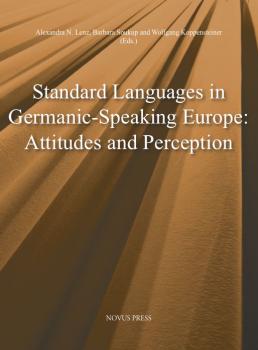Standard Languages in Germanic-Speaking Europe: Attitudes and Perception
Keywords:
Standard LanguagesSynopsis
The seeds for this present volume were planted in pre-pandemic times, when it was still possible to physically gather groups of scholars in a room for lively discussion and exchange, without first submitting airflow contingency plans, distributing disin-fection and test kits, checking vaccination statuses, or issuing mask mandates (or, all else failing, staging things entirely online). It was thus that on Saint Niklas’ day in December of 2018, a group of thirteen keynote speakers, and a well-sized audi-ence of peers, first convened in a conference room at the Austrian Academy of Sciences for three days of jointly exploring “Standard Languages in Europe: Atti-tudes & Perception”, as the conference was entitled.
The meeting was organized under the auspices of the Special Research Pro-gramme (‘SFB’) “German in Austria. Variation – Contact – Perception” (financed by the Austrian Science Fund FWF), and was further sponsored by the Austrian Academy of Sciences and the University of Vienna. The local organizing committee consisted of Alexandra N. Lenz (Austrian Academy of Sciences & University of Vienna), Wolfgang Koppensteiner (University of Vienna), Barbara Soukup (Austri-an Academy of Sciences), and Rita Stiglbauer (University of Vienna), with Steff Moog serving as culinary executive. The keynote speakers were (in alphabetical order): Elisabeth Buchner (University of Salzburg), Stephan Elspaß (University of Salzburg), Anne-Sophie Ghyselen (Ghent University), Wolfgang Koppensteiner (University of Vienna), Alexandra N. Lenz (University of Vienna), Chris Mont-gomery (University of Sheffield), Nicolai Pharao (University of Copenhagen), Al-brecht Plewnia (ids Mannheim), Christoph Purschke (University of Luxembourg), Unn Røyneland (University of Oslo), Regula Schmidlin (University of Fribourg), Barbara Soukup (Austrian Academy of Sciences), and Rebekka Studler (University of Basel).
Chapters
-
Preface and Acknowledgements
-
Introduction: Standard languages in Germanic-speaking Europe – Attitudes and perception
-
Standard German in Austria from the folk perspective: Conceptualizations, attitudes, perceptions
-
Standard and non-standard varieties in Austrian schools: The perspectives of teachers and students
-
Standard variation and linguistic attitudes in German-speaking Switzerland: From the etic to the emic perspective
-
Measuring attitudes towards standard German and German dialects: Results of recent representative survey data from Germany
-
Attitudinal and perceptual research as part of the methodological toolbox to define standard languages: Advances, issues and perspectives in research on Belgian Dutch
-
Perceptions of non-standardness in an assumed ‘Standard’ English variety
-
Understanding standard language: A psycholinguistic look at Danish regional and casual speech variation

Downloads
- Preface and Acknowledgements.pdf Preface and Acknowledgements.pdf
- Introduction.pdf Introduction.pdf
- 01 Standard German in Austria from the folk perspective.pdf 01 Standard German in Austria from the folk perspective.pdf
- 02 Standard and non-standard varieties in Austrian schools.pdf 02 Standard and non-standard varieties in Austrian schools.pdf
- 03 Standard variation and linguistic attitudes in German-speaking Switzerland.pdf 03 Standard variation and linguistic attitudes in German-speaking Switzerland.pdf
- 04 Measuring attitudes towards standard German and German dialects.pdf 04 Measuring attitudes towards standard German and German dialects.pdf
- 05 Attitudinal and perceptual research as part of the methodological toolbox to define standard languages.pdf 05 Attitudinal and perceptual research as part of the methodological toolbox to define standard languages.pdf
- 06 Perceptions of non-standardness in an assumed ‘Standard’ English variety.pdf 06 Perceptions of non-standardness in an assumed ‘Standard’ English variety.pdf
- 07 Understanding standard language.pdf 07 Understanding standard language.pdf
Forthcoming
Categories
License

This work is licensed under a Creative Commons Attribution-ShareAlike 4.0 International License.

